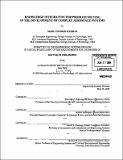| dc.contributor.advisor | Kirkor Bozdogan. | en_US |
| dc.contributor.author | Haddad, Marc George | en_US |
| dc.contributor.other | Massachusetts Institute of Technology. Engineering Systems Division. | en_US |
| dc.date.accessioned | 2008-12-11T18:39:30Z | |
| dc.date.available | 2008-12-11T18:39:30Z | |
| dc.date.copyright | 2008 | en_US |
| dc.date.issued | 2008 | en_US |
| dc.identifier.uri | http://hdl.handle.net/1721.1/43853 | |
| dc.description | Thesis (Ph. D.)--Massachusetts Institute of Technology, Engineering Systems Division, 2008. | en_US |
| dc.description | Includes bibliographical references (p. 238-248). | en_US |
| dc.description.abstract | The development of complex products requires widespread knowledge interactions among a significant number of individuals and teams designing numerous interrelated components. Increasing product complexity typically leads to a corresponding increase in the types and sources of knowledge that need to be tapped during development, and a common strategy for managing product complexity is to outsource parts and components to external suppliers. As a result, the knowledge required for development is increasingly specialized and distributed across multiple boundaries spanning large-scale organizational networks, thus requiring the subsequent integration of this knowledge in order to accomplish the development task. A framework for knowledge integration in the development of complex systems in a large-scale organizational context is proposed in this thesis using an extensive review of the pertinent literature. The framework consists of the main channels, strategies, practices and mechanisms most commonly used to transfer, share and apply knowledge in the course of complex technical problem solving. The framework is progressively refined using empirical data collected through several rounds of interviews and a questionnaire instrument administered across three major aircraft programs in the defense aerospace industry. We find that knowledge integration in routine problem solving situations is most efficiently and effectively accomplished through extensive transfer and sharing of codified information using formal mechanisms such as information systems, while knowledge integration for major non-routine troubleshooting events requires extensive integration of individual expertise and know-how through both formal and informal advice sharing as well as direct assistance across internal and external organizational boundaries. | en_US |
| dc.description.abstract | (cont.) A principal contribution of this research is in demonstrating how different characteristics of the engineering artifact defined in terms of product complexity, architecture and technology newness, and different aspects of problem solving including problem type and novelty, drive the knowledge integration process and the organizational system. We conclude that permeability of cross-program boundaries, direct relationships with functional groups and rich tacit knowledge flow from suppliers are critical for countering rampant firefighting in complex product development. | en_US |
| dc.description.statementofresponsibility | by Marc George Haddad. | en_US |
| dc.format.extent | 279 p. | en_US |
| dc.language.iso | eng | en_US |
| dc.publisher | Massachusetts Institute of Technology | en_US |
| dc.rights | M.I.T. theses are protected by
copyright. They may be viewed from this source for any purpose, but
reproduction or distribution in any format is prohibited without written
permission. See provided URL for inquiries about permission. | en_US |
| dc.rights.uri | http://dspace.mit.edu/handle/1721.1/7582 | en_US |
| dc.subject | Engineering Systems Division. | en_US |
| dc.title | Knowledge integration for problem solving in the development of complex aerospace systems | en_US |
| dc.type | Thesis | en_US |
| dc.description.degree | Ph.D. | en_US |
| dc.contributor.department | Massachusetts Institute of Technology. Engineering Systems Division | |
| dc.identifier.oclc | 263025866 | en_US |
